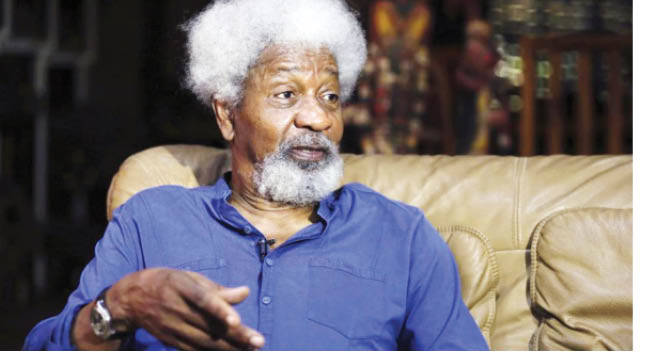
Olaokun Soyinka is a medical doctor and a former Ogun State commissioner for health. He is the first child of Wole Soyinka, the first Nobel Laureate in Africa. Here, he talks about growing up with his dad, what easily upsets him and more. Excerpts:
Daily Trust: How would you describe your father?
Olaokun Soyinka: He is an intellectual. He is also principled, consistent and humorous, a global citizen and a frequent flyer.
DT: What kind of father would you say he was when you were a child and now?
Olaokun: He is not a disciplinarian in the usual sense. He never spanked us, but he didn’t need to. One stern look from him was usually enough to call us to order.
I think he becomes more interested in children once they develop personalities and individuality. He is not someone who imposes his views on you but of course on behavioural matters such as honesty, kindness, consideration and diligence at work, he is very clear.
He was incredibly busy when we were kids growing up, so he was away a lot. It didn’t help with him being jailed during the civil war.
 |
DT: What fun childhood memories will you like to share?
Olaokun: Growing up as the son of a respected and popular academic meant that you were always being spoiled by friends and acquaintances. I used to go visit him in the office when he was at the department of Theatre Arts in UI and then go down to the carpentry workshop where the carpenters gave me tools and let me make things.
Dad loved unusual vehicles and we used to love to ride round campus with him in the Mini Moke, an open car with no doors or sides. He was not much into sports when we were young but I do have a memory of playing football with him once. I fancied myself as a goalkeeper and set up some goalposts in the garden and got him to take some shots. I thought he would be no good but he surprised me with quite a mean and accurate right foot.
Perhaps my favourite memory is going with him shopping for a massive earthen ware pot. We were having a party and he was going to bake a whole goat. The building of the fire, preparing of the animal, stuffing and seasoning it, getting it into the pot, sealing it up and putting it on to bake, took hours. That was only matched by the hours of waiting and then the delicious finale. I have been a goatmeat addict since then.
DT: At what point in your life did you realise that your father is famous?
Olaokun: That is an interesting question because initially you don’t realise it even though you are seeing the effects. It is natural for a child to admire his or her dad. I therefore took it for granted that other people would too.
After a while however, people would talk to me and tell me what they thought of him. I still didn’t realise he was famous in that sense. What made me realise it was the books. For a kid, once you begin to read, you get a feeling that only special people wrote books and had their name on the cover. When I realised he was a published writer and saw his name on books then I think I began to understand.
DT: Has being Wole Soyinka’s son opened any doors for you?
Olaokun: Most definitely, although it has closed some too. He is very much against nepotism so he avoids trying to personally give his children an unfair advantage over others, however there are many indirect benefits.
When I went to school in the UK, it was quite daunting. I was worried about racism on top of being a new kid who had joined late in the 6th form. However, my fellow students who had done O’ level English had studied ‘Telephone Conversation’. When they discovered my name and mentioned the coincidence I proudly informed them that it was my father who wrote it.
I became the kid who was pretending to be the poet’s son. It was surprisingly difficult to prove who I was, but once I did I was granted an immediate pass to the ‘in-crowd’.
The biggest advantage of being a Soyinka, and one that I still appreciate and enjoy to this day, is the fact that I can gain people’s trust more easily. When your motives are honest it is the most frustrating thing not to be trusted and indeed in today’s Nigeria it is dangerous to trust people with money or to stick to an agreement, or to go the extra mile to do a good job. I have found, however, that in some cases where I really needed a person to have that faith, to take a risk on me, I often heard the phrase, ‘the fruit does not fall far from the tree’ as they decided to take the chance with me. I have really appreciated that.
We also say that to get on in Nigeria, it is who you know. Another advantage of the name has been meeting or getting to know people. My father knows many people and is known by many more. Often I meet people that I don’t know but who know me, or know of me, perhaps because they knew me when I was young or they knew my father had a son. That helps too.
I am sure there are many instances in which I was not even aware that something went well for me because someone somewhere wanted to favour the name. I know some people reason that since he has done a lot for Nigeria, helping one of his offspring is the least they can do.
The converse may be true too. There are probably situations in which I was quietly side-lined from something because it might have been thought to be too risky to have a Soyinka knowing about certain things.
DT: If he had not become a writer, what other profession do you think he would have excelled at?
Olaokun: I think he would like to have been a mathematician or something equally mentally demanding, or perhaps an actor or a musician. Many people have tried to persuade him to go into politics but I don’t think he would be a good politician. They say in politics there are no permanent friends, only permanent interests. For him however, there are permanent felons and I don’t think he would be able to compromise and work with certain people who may have had a chequered past who he finds himself in a party with.
When I was younger I often saw him as too serious and used to wonder what he would be like in a job that required the opposite qualities. I wonder what he would have been like as a stand-up comedian.
DT: What easily upsets him?
Olaokun: When one intrudes upon his peace. Also these days, asking for a selfie with him.
DT: Was there ever any pressure to follow in his footsteps?
Olaokun: I am always interested in the stories of the children of famous people, especially achievers, it’s an interesting dilemma. He never pressured me. I believe a lot of pressure can come from within when the child is close to greatness and sets it as a target to meet or exceed. It can be a great motivation but it can also create frustration or even a complex. So I made up my mind early to enjoy his success but pursue my aims in a different field, and as long as I do my best then I should be content.
So I have no ambition to win a Nobel Prize. I am no poet but will definitely write a book or two, but that would be for many other reasons than being his son. I have embraced his social activism side and will happily pursue that because I believe that Nigeria needs activists.
DT: What do you usually talk about these days when together?
Olaokun: Those who know Wole Soyinka know that you can never have a dull conversation. We have wide ranging chats. Nigerian politics is clearly high on the agenda, but we talk about family, friends, the arts, international affairs, science and medicine, and swap humorous anecdotes.
DT: What’s the singular, biggest lesson he has taught you?
Olaokun: He teaches by example. I think the most important thing I have learned from him is the value of not being materialistic. It leads to peace of mind and helps one to focus on what I believe are other important values such as humanitarianism which I also see in him all the time.

 Join Daily Trust WhatsApp Community For Quick Access To News and Happenings Around You.
Join Daily Trust WhatsApp Community For Quick Access To News and Happenings Around You.


